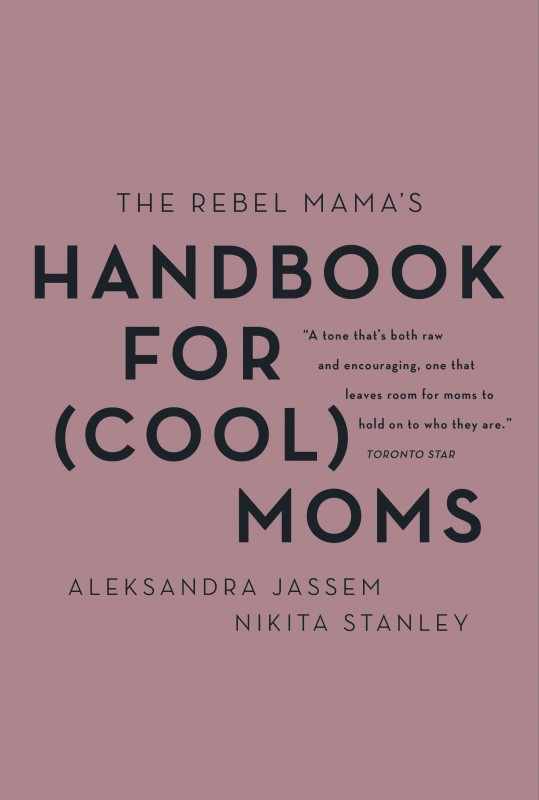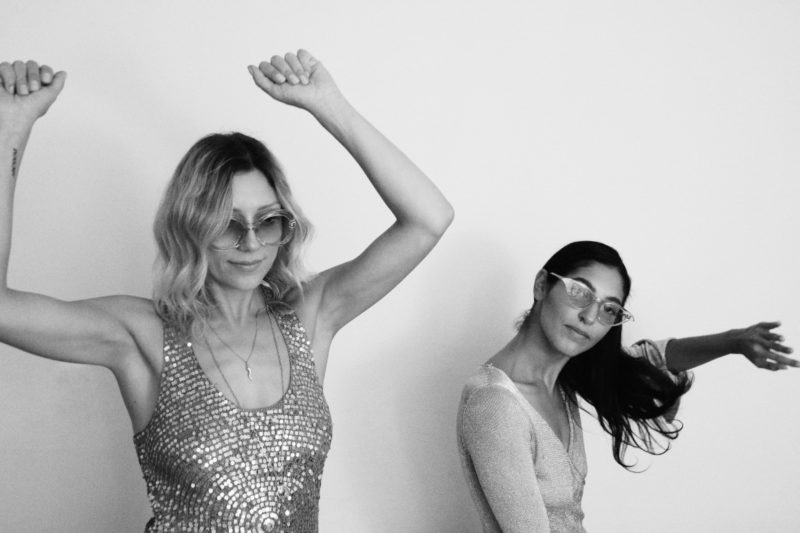If you are a mom-to-be or a new mom and you aren’t connecting with the parenting advice books out there, Aleksandra Jassem and Nikita Stanley have got you covered! The Rebel Mama’s Handbook for (Cool) Moms, available online now, is not just laugh out loud funny, it has solid advice that women need. The information isn’t an encyclopedia of boredom. It is advice your best girlfriend would give you as long as a Pinterest Mom wasn’t in the room. With everything from advice on the birthing process, to losing your postnatal virginity, to the formula debate, checklists, career advice and even cocktail recipes, it has you covered while your child is an infant through toddler. It’s hilarious, honest and authentic, just like the women who wrote it.

Jassem and Stanley are best friends, and it is easy to see that. They complete each other’s sentences in a way that only good friends do. They were acquaintances who got pregnant within 6-weeks of each other and that solidified their friendship. Jassem is mom to a 6-year-old and Stanley has a 6 and 4-year-old. They collaborate on The Rebel Mama’s website which started because there was no content out there that spoke their language. They admit to walking that fine line between keeping their content honest and raw and creating the quality advice that moms are looking for. We had a chance to speak to them recently about their book and their own experiences as Rebel Mamas.
Writing a book is typically a solitary experience. Take us through the process of writing the book together. How did you know when to collaborate and when to divide and conquer?
NS: We wrote the book together, but we are also used to collaborating on writing and creating content for our website, TheRebelMama.com. We were lucky enough to build out the skeleton of the book using existing content from the site. That content was then reworked, because writing for the internet and writing for a book requires different language. Some posts Aleks had written and some I had written, so we sat down with our lists. We were responsible for rewriting and editing our own respective works. We sat down with everything and made a master list of anything that we thought was missing and divvied those up.
AJ: I think what makes it different than a typical parenting guide or book is that when we pulled that content from our website, we were writing about the ideas as they were happening. The feeling is different than when writing in hindsight or versus guides that talk about what to do when your child is two, but they are now a fifteen-year old. You forget all these little details. I think that comes off of the pages too.
The Rebel Mama’s Handbook for (Cool) Moms feels like it’s written in one voice. How were you able to achieve that flow?
AJ: Editing – lots of editing.
NS: We both wrote our respective first drafts separately, but then, everything that is written gets funneled through me for a final edit to get everything into a consistent voice.
AJ: Nikita, I would say that you are the editor-in-chief because you actually studied writing. She is a classically trained writer.
NS: Typically, for online purposes, I do all of the writing and Aleks does all of the visuals. Sometimes, if she is inspired, she’ll write something, but it always passes through me before it goes out to make sure that it is all in a consistent, cohesive voice. For the book, we outsourced a second edit to our book editor who is also the author of the “Mom’s Night Out” chapter.
AJ: We loved that! Sometimes when we have to do book readings, that is the number one thing that people ask us to read and we love reading it out loud.
It was such a visual scene – I can see it being adapted for a movie.
NS: From your mouth to God’s ears sister!
AJ: There are so many funny things in there. It is such a different understanding of motherhood. If you are a new mom, and you don’t know what to expect, you can get a real feel for it, instead of something that sounds like an encyclopedia.

What is the difference between a traditional mother and a Rebel Mama?
AJ: [Laughs] We’re rebellious by nature. The traditional mom is focused on the great sacrifices that she makes in putting aside her own identity and her own self-interest for her family. We are trying to push the opposite angle.
NS: Traditional motherhood tends to be characterized by martyrdom. Rebel Mamas just don’t subscribe to that at all because they understand that their happiness matters. In fact, their happiness is imperative to the whole family.
AJ: Yeah, if you’re a happy mom, your family is going to be better for it.
NS: The just grin and bear it mentality was kind of old school, which is fine, but it’s time for that to go.
Nikita has said, “Our goal is to always present this idea that there is more than one formula for a healthy family, and there’s more than one kind of woman who can be a good mom.” What makes for a good mom?
AJ: If you truly love your child, it doesn’t matter how you do it, you are a good mom. You aren’t going to be perfect, but it’s the love and the care that makes you a good mother.
NS: It’s the love, care and effort. There has to be a certain level of trust in yourself and your own instincts to be a good mom. It tends to get lost…
AJ: We focus on specific points like you can’t be a good mom because you aren’t making pancakes the way they showed you on Pinterest. That doesn’t make you a good mom. A good mom listens to their child or spends time with them.
NS: I also think that if you can teach your kid by example, which is how children learn, they don’t learn just by what you say to them. If you can teach them how to love themselves and how to treat others and how to be an advocate for themselves in tricky situations, I think you have done your job.
You apologize at the top of the book for what you said when you were childless. What would you say to your own moms now that you have been walking in their shoes?
AJ: I’m sorry.
NS: Thank you. I would say it very humbly and quietly.
AJ: I remember actually calling my mom when Oscar was a baby, and you really just have a different understanding of what your own mother must have gone through when you go through it yourself. You really feel that need to either say thank you or I’m sorry because you just really don’t understand before that.
NS: You wrongfully judge your parents too. You don’t understand the breadth of circumstances that they were dealing with when you were little. Then, you have small children and you are like “Oh my f*$king God, this is so hard. There is definitely a lot of respect for our parents.
AJ: A lot of tails between our legs.

The book had many laugh out loud sections. Two of the funniest were when you compared a toddler to a drunk college roommate and Mom’s Night Out. How did you get through those moments?
NS: You literally just have to laugh.
AJ: You almost start to see humour in everything. It is hard, tiring and it’s so challenging. Sometimes, it’s funny how ridiculous it all is.
NS: I think that’s why we put so much humour in the book too. It’s just a reminder that you can fall into the trap of taking this very seriously and drowning in a sea of your own tears at the end of the day. You cannot take it so seriously; you just have to survive.
AJ: The books that were available to us when we became pregnant were too serious. It shouldn’t sound like accounting when your starting a new chapter in your life.
There was a particularly poignant part of the book where you give mom’s permission to say sometimes having a baby sucks. Why do mothers have such a hard time admitting this?
NS: Saying things like that out loud, depending on who you say it to, has a chance of being met with some combination of shame and guilt. It’s also something that moms are scared to confront, especially when they are so tired and feeling so lost. If they articulate that they are met with, “You should just be appreciative of every moment that you have…”
AJ: I think it’s important that you have a support system and are around people you feel comfortable saying the truth to. We were very lucky we have that. One friend in particular literally said, “Good luck.” She laid it out and I appreciated it so much because when you don’t know what you are getting into, everyone says, “Don’t worry, it’s amazing, it’s a miracle”. Then, you get there and it’s not and you feel like a terrible person, when in fact everyone feels that way.
NS: And admitting difficulty and that what you are doing is hard, is the first step to getting help and support that moms are so direly lacking. We need to be comfortable with not sugar-coating the reality of parenthood if we want to get any kind of help.
AJ: It’s nice to see things getting there now. We landed on the scene in 2014, and it’s becoming more open, honest, raw and authentic out there.
NS: We like to think that we had a small hand in that change.
Last, but not least, if moms can only remember one thing from your handbook, what would you like that to be?
AJ: I would like them to leave with the sense that everything is going to be OK and that if they don’t have a support group in real-life, we hope that this book can be that.
NS: We want moms to give themselves a break. Motherhood is really hard and we are able to show that in the book without making it too terrifying. The reality is that we are all winging it. There is no instruction manual. Everyone is doing their best and it’s OK. Your best is great and if you make sure that you are happy and your kids will be happy. Take other people’s advice with a grain of salt and trust your gut.




